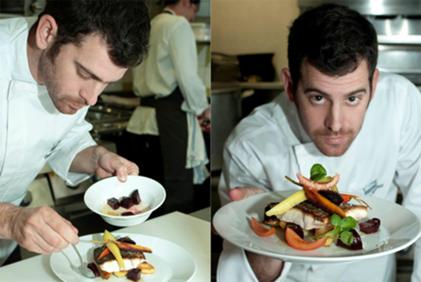Israeli Chefs Go Back to Their Roots To Find Inspiration in the Kitchen
Feb 25, 2014

Chef Omer Miller
Copyright © Dor Malka
Chef Avi Biton launched a new menu this summer at his Tel Aviv restaurant Adora: dishes from Andalusia. “Andalusia is a part of Spain that boasts food highly influenced by Moroccan cooking”—it was ruled centuries ago by the Moors—“and that is part of my DNA,” said Biton. He traces his family’s origins on his father’s side to Fes, a Moroccan city that saw an influx of Jews from Andalusia after their 15th-century expulsion from Spain. To this day the influence of Andalusian cuisine can be detected in the cooking of the Jews from Fes. “Some of the dishes in the new menu, such as veal meatballs, are dishes I ate at home,” said Biton, whose special offerings also include such regional specialties as calamari migas, salmorejo, and flamenquín.
Biton’s next special menu will reflect “Ottoman cuisine,” a nod to his mother’s side of the family, which is Turkish. “As a cook I’m interested in researching every kind of cooking, and after being immersed in the French and Italian cuisines for many years, I felt a need to go home,” he said. “For me, returning to my own culinary roots is a personal journey.”
Biton is just one of many Israeli chefs going back to their roots. Since Israel has no national history of haute-cuisine, the chefs who are overseeing the country’s top restaurants are inventing and reinventing “New Israeli Cuisine” as they go along—often by looking at the foods from their familial pasts. When this trend first began in the mid-to-late 1990s, it seemed like a bold, unconventional step, but today no respectable chef in Israel can ignore the dishes his grandmother used to make. Recreating those dishes, with a modern twist, is perceived these days as a badge of honor.
“Going back to your roots is one of the main characteristics of the New Israeli Cuisine,” said Janna Gur, editor in chief of Al Hashulchan—meaning “On the Table”—Israel’s top gastronomic magazine. “It’s the most natural thing for Israeli chefs to do, since Israeli cuisine is based on two things: on Palestinian cooking and on ethnic cooking. We are an immigrant society, which means that we have more than 70 variations of Jewish cooking in Israel. Wherever Jews lived around the world, they created their own version of the local food, which differed from what their neighbors ate because of kashrut laws, holidays, etc. All these different cooking traditions arrived in Israel, which is in fact the only place where all of them still exist, since some of the countries Jews came from don’t have a Jewish population anymore. Over the years many ethnic dishes, like shakshouka, bourekas, or jachnun, became staples of Israeli cooking and stopped being regarded as ethnic.”
The first time ethnic food was incorporated in local haute-cuisine was in the 1990s, when celebrity chef Haim Cohen served shakshouka with foie gras at Keren, which opened in the 1980s as a French restaurant, before it gradually morphed into the spearhead of what is known as New Israeli Cuisine and eventually closed in 2002.
Before the ’90s—the decade that marked a change in perception of Israeli society from a melting pot to a more multicultural salad bowl—Israelis pretty much believed that elite food meant French food, and you wouldn’t expect to find anything remotely ethnic in a high-end restaurant.
Chefs like Haim Cohen and Ezra Kedem, who connects with his Iraqi roots at Arcadia in Jerusalem since 1995, changed all that. Later on chef Raffi Cohen took this a step forward: While he apprenticed at esteemed establishments such as Alain Passard’s L’Arpège in Paris, London’s The Oak Room, and New York’s Nobu, he still chose to base the menu at his Tel Aviv restaurant Raphael on recipes he learned from his Moroccan grandmother Aziza, whom he turned into a household name among foodies.
Most Israeli chefs who are returning to their culinary roots have those roots in the Middle East and North Africa. “Someone once told me: If you want to succeed in Israeli cooking you better have a Moroccan grandmother, and if you don’t—you better invent one,” Gur said, remembering an inside-joke known in local culinary circles. “Middle Eastern and North African food is much more popular in Israel, and there are many reasons for that.
Read the full article here.



